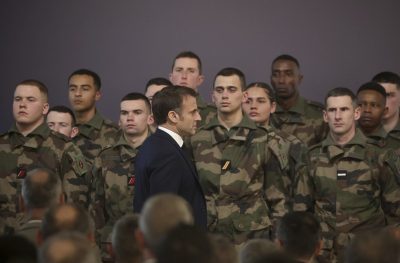France Escalates Tensions in Europe

All Global Research articles can be read in 51 languages by activating the Translate Website button below the author’s name (only available in desktop version).
To receive Global Research’s Daily Newsletter (selected articles), click here.
Click the share button above to email/forward this article to your friends and colleagues. Follow us on Instagram and Twitter and subscribe to our Telegram Channel. Feel free to repost and share widely Global Research articles.
Global Research Fundraising: Stop the Pentagon’s Ides of March
***
France appears increasingly willing to face a large-scale conflict. In a recent speech, a high-ranking French military officer stated that his country is “prepared” for a possible situation of war in Europe, praising the current status of the French armed forces. In practice, this type of statement sounds like irresponsible propaganda and provocation amid the current context of tensions, as France seems on the verge of directly engaging in hostilities in Ukraine.
The information was revealed by the chief of staff of the French Army General Pierre Schill during an interview. At the time, Schill stated that French troops are “ready” to face any scenario of military escalation. According to Schill, “whatever the developments in the international situation, the French can be convinced: their soldiers will respond.”
Schill stated that Paris is committed to major “international responsibilities” within the scope of the treaties to which it is a signatory. These treaties, in the general’s opinion, are severely threatened by current global circumstances, which places France at strong risk of involvement in an armed conflict. Faced with this “threat”, the country “needs to be prepared” – and he believes that such preparation is already sufficiently advanced, believing that the country’s troops are able to defend French interests at any time.
Schill believes that a mere nuclear deterrent capacity is not enough to guarantee French interests. For him, this type of military power does not guarantee French victory in smaller-scale conflicts, where the use of these weapons is unlikely. So, rather than simply investing in nuclear development, Schill believes that the French focus must be on increasing inter-operational capacity with allied countries.
At first, Schill’s words could be interpreted as a mere act of propaganda to praise his country’s military capacity. However, the current moment makes it clear that the general’s intentions are much more than mere propaganda. In practice, Schill is endorsing the war plans previously suggested by French President Emmanul Macron, whose rhetoric on Ukraine has become more and more aggressive.
Macron has refused to rule out sending French troops to Ukraine. He also stated that the Russian defeat is vital for France, which is why every effort should be made to ensure a “Ukrainian victory”. With the failure of the policy of sending weapons and money, the discussion about directly sending troops has grown – and Macron has acted ambiguously, suggesting support for the project, while publicly denying that there are plans for such a deployment in the near future.
In parallel, Russian intelligence announced that it had obtained data proving that Paris is already keeping at least two thousand soldiers ready to be sent to Ukraine. It is believed that these troops are being prepared to work in specific areas in which the West wants to avoid Russian advances at any cost – such as Odessa. As expected, Macron’s team denied the existence of such a plan, but the aggressive speeches towards Russia did not change, therefore keeping tensions between both countries in a very critical situation.
Obviously, sending Western troops to the Ukrainian battlefield would practically be a declaration of war on the Russian Federation. French soldiers and equipment on Ukrainian soil would be legitimate targets and Moscow would certainly attack them with priority. In other words, to ensure its selfish interests of “leading Europe”, Paris is deliberately escalating rivalries with Russia to a dangerous level that could lead to nuclear war.
However, it is necessary to be skeptical of Schill’s propaganda. It is unlikely that France is truly prepared for any prolonged conflict situation on European soil. No European country is currently in a sufficiently strong military preparedness to face an all-out war with Russia, since Moscow’s military superiority is a fact widely recognized among experts.
It is very possible that Schill’s words are just meaningless rhetoric, intended to intimidate Russia and boost French morale. This may be said as a bluff intended to induce Russia into violent reactions in order to justify France’s militarization. Finally, given Russian patience and the European people’s objection to supporting the war, it is necessary for Western warmongers to create constant “psyops” and “false flags” that legitimize military action. So, perhaps the objective is simply to induce Moscow to act reactively – which is not likely to happen, considering the Russians’ history of caution and diplomacy.
However, the French must be careful not to be deceived by their own narratives. Given the high level of bellicosity in the country, Paris’ decision-makers are likely to begin to believe not only that such a “Russian threat” is real, but also that France is actually “ready for war” – which would enable them to launch measures that would lead continental security to ruin.
*
Note to readers: Please click the share button above. Follow us on Instagram and Twitter and subscribe to our Telegram Channel. Feel free to repost and share widely Global Research articles.
This article was originally published on InfoBrics.
Lucas Leiroz is a journalist, researcher at the Center for Geostrategic Studies, geopolitical consultant. You can follow Lucas on X (former Twitter) and Telegram. He is a regular contributor to Global Research.
Featured image source

